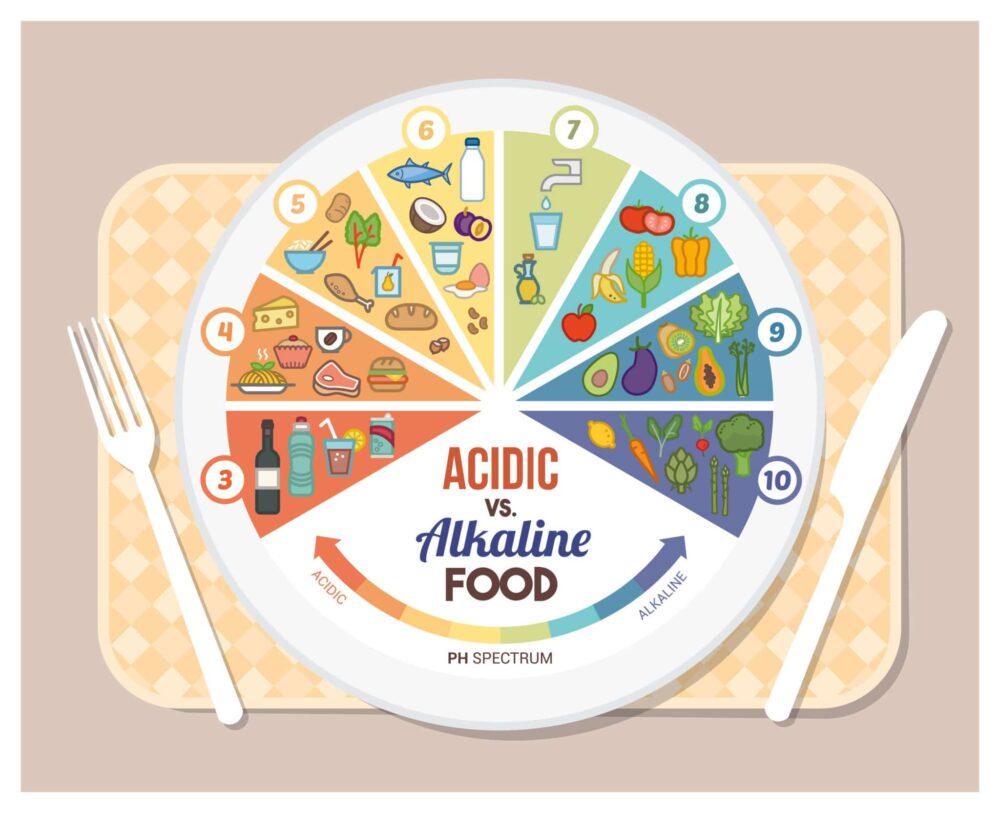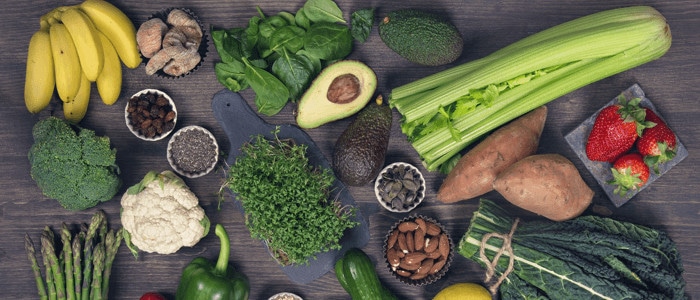Life itself depends on organisms, like your body, achieving and maintaining a pH balance that allows for regular functioning. In all living organisms, deviations from a healthy pH due to diet and disease increase mobility and mortality. In other words, if your body’s pH is off balance, you will incur health issues as a result.
pH stands for the power of hydrogen, and is a scale that measures levels of the hydrogen ion in the body. The total pH scale ranges from 1 to 14, with 7 being considered as neutral. A pH level that is lower than 7 is said to be acidic, and higher than 7 is said to be alkaline. In the human body, the ideal pH balance is slightly alkaline, or between 7.30 and 7.45. We can balance our pH levels through the foods that we eat; however, the problem is that many foods that we eat are very acidic. Eating an alkaline diet over time can help you to maintain a healthy balance in your body.
 What is the Alkaline Diet?
What is the Alkaline Diet?
Over the past several years, authors and researchers have promoted what is known as the alkaline diet. The alkaline diet is based on the idea that alkaline foods help to create an environment in the body that is not conducive to disease.
Some health specialists questioned the validity of these claims, but increasing literature does, indeed, demonstrate some connections between the consumption of alkaline foods and a lower risk of disease. This is not necessarily because of the food’s inherent alkaline nature, but rather because of the particular nutrients and components these foods contain that promote overall health.
Is Our Diet Really Acidic?


Not only that, as a result of the changing pH of our diet, the mineral micronutrient content of our bodies has also changed. Two key salts, calcium phosphates and carbonates, make up a “reservoir” of base in our bodies, meaning they are naturally a slightly higher pH (less acidic). Because the modern diet is more acidic, due in part to so much sodium in the diet, these salts are released into the system to keep our bodily pH balanced, and then lost in the urine. In other words, the higher concentration of sodium in our diets has caused our bodies to release these salts within our bodies in order to maintain a proper pH.
Additionally, as we age our kidneys aren’t as efficient in regulating bodily pH, and we are more vulnerable to metabolic acidosis caused by diet.
It is important to note that individual foods and meals cannot change our pH. Eating an orange, for example, will not make our blood more acidic. Dietary patterns over a lifetime, however, can cause changes in our body’s chemical working to maintain a healthy pH.
Some theories discuss that acidic diets leech calcium and phosphorus from the bones, but this idea has received a lot of challenges from the medical and research community. Others believe that it is the lack of processed foods that are the key element of alkaline diets.
Which Foods are Acidic?
Certain food groups are considered acidic, others alkaline, and others are neutral.
- Acidic foods include: Meat, poultry, fish, dairy, eggs, grains and alcohol
- Neutral foods include: Natural fats, starches and sugars
- Alkaline foods include: Fruits, nuts legumes and vegetables.
It is important to note however, that not all foods considered to be acidic contribute to an anti-alkaline diet. Protein, for example, contains components that are important for bone and muscle health. Additionally, sugars, considered to be neutral, would are not beneficial in alkaline diets.
6 Alkaline Foods That Can Help Improve Your Health


Boost your health by adding these powerful foods into your diet:
- Nuts and seeds: sunflower seeds, chia, almonds, walnuts and pumpkin seeds. For an extra health boost, avoid eating salted or flavored varieties.
- Leafy greens: spinach, lettuce, kale, collard greens and bok choy, among many others.
- Plant-based protein: soy, tofu, garbanzos and legumes
- Whole grains: quinoa, brown rice, corn and whole wheat
- Fruits: melon, pears, apples, watermelon and bananas, among others.
- Other veggies: carrots, onions, broccoli, cauliflower, squash and sweet potato.
Final Thoughts
Even though some of the claims about alkaline diets are not scientifically backed, there are still many benefits to foods that are naturally alkaline. They can support heart health, build stronger bones, increase the circulation of antioxidants and reduce muscle spasms, to name a few benefits.
Do you eat a healthy diet? Please comment below to share some of your favorite foods and recipes with our readers.




